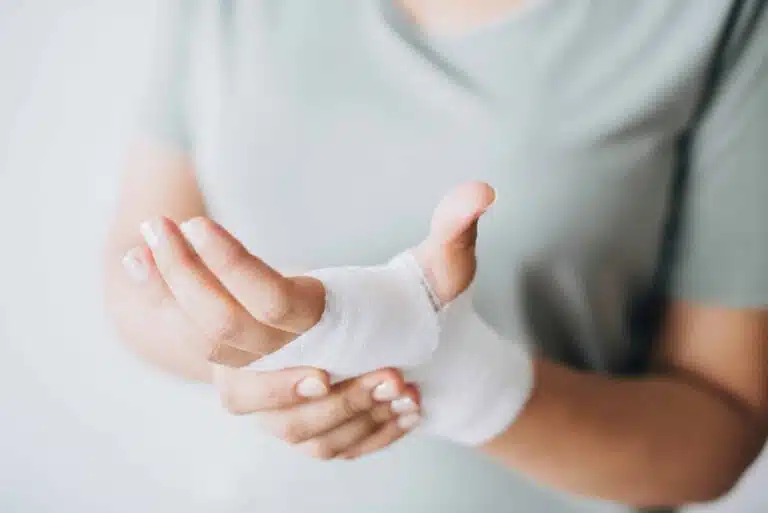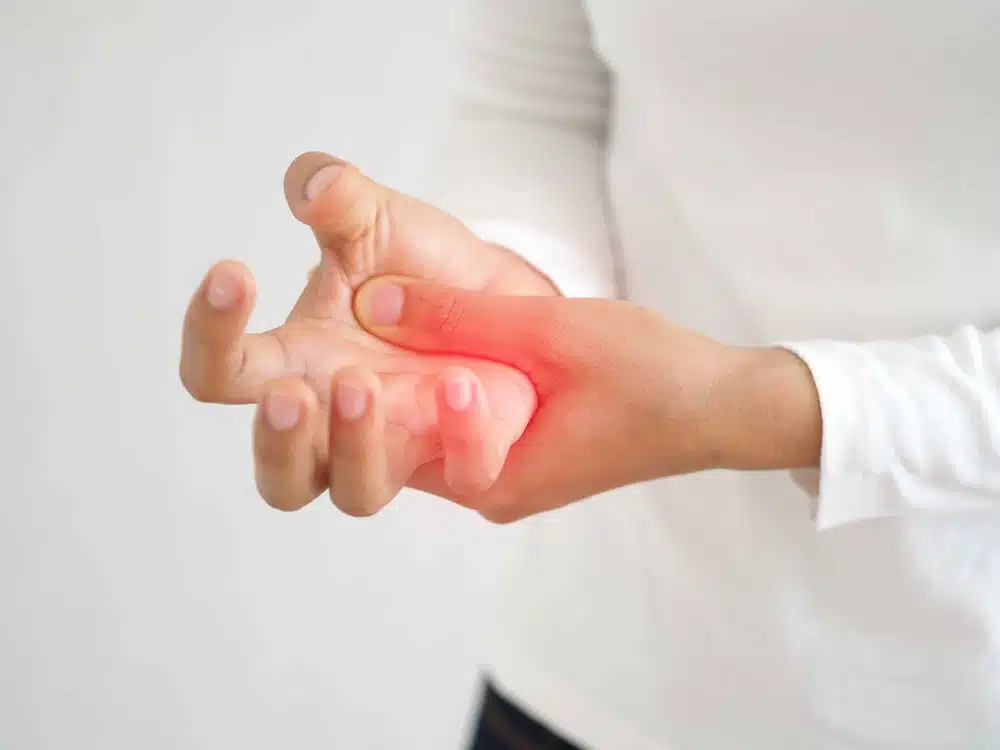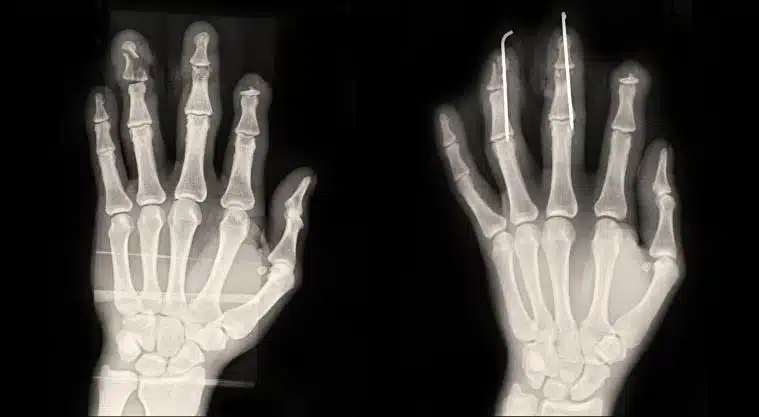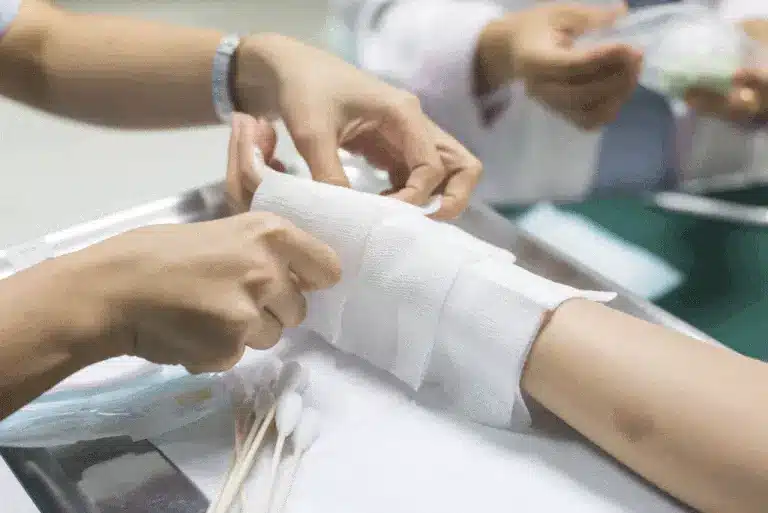This website uses cookies so that we can provide you with the best user experience possible. Cookie information is stored in your browser and performs functions such as recognising you when you return to our website and helping our team to understand which sections of the website you find most interesting and useful.
If the broken bones in your fingers or hand are in too many pieces, displaced, or have broken through your skin, surgery can be done to restore the bones back into place while the fractures heal.
Finger/Hand fractures fall into 2 categories:
- Non-displaced, where the bones remain aligned
- Displaced, where the bones shift out of alignment.
Hand fixation surgery may be required for various types of injuries to the hand, including:
Fractures can occur in any of the bones in the hand, including the metacarpals (long bones in the palm), phalanges (finger bones), and carpal bones (wrist bones). These fractures may result from falls, sports injuries, or other traumatic events.
Dislocations happen when the bones in a joint are forced out of their normal positions. In the hand, dislocations commonly occur in the fingers or thumb joints due to trauma or hyperextension.
Ligament injuries are tough bands of tissue that connect bones and provide stability to joints. Injuries to the ligaments in the hand, such as sprains or tears, may require surgical repair to restore stability and function.
Tendon injuries are fibrous tissues that connect muscles to bones and enable movement of the hand and fingers. Injuries to the tendons, such as lacerations or ruptures, may necessitate surgical intervention to repair the tendon and restore normal hand function.
Crush injuries to the hand can result in damage to bones, soft tissues, and nerves. In severe cases, surgery may be required to reconstruct the injured structures and restore hand function.
Avulsion injuries occur when a portion of tissue is torn away from its normal attachment site. In the hand, avulsion injuries can affect muscles, tendons, or ligaments, and surgical repair may be necessary to reattach the torn tissue and restore function.

Hand fixation surgery, also known as hand osteosynthesis or hand fracture fixation, is performed to stabilize and repair broken bones in the hand. It is commonly used to treat fractures, dislocations, and other traumatic injuries to the bones of the hand.
During the surgery, Dr. Pournaras will use specialized implants such as screws, plates, wires, or pins to hold the fractured bones in place while they heal. The specific type of fixation used depends on the location and severity of the fracture, as well as other factors such as the patient’s age and overall health.
Fixation is typically performed when the fracture is displaced because improper finger alignment can affect normal hand function. The actual fixation method will depend on the location and pattern of the break. Hand fixation surgery aims to restore the normal alignment and function of the hand, reduce pain, and promote healing.
Following the surgery, physical therapy may be recommended to regain strength, flexibility, and range of motion in the fingers and hand. Fixation surgery can restore hand function and enable patients to resume their daily activities with minimal long-term complications.
Finger /Hand fracture fixation is an outpatient procedure and patients go home the same day.


Hand Fractures Open Reduction Internal Fixation
Hand fractures requiring open reduction and internal fixation (ORIF) cannot be adequately treated with non-surgical methods such as casting or splinting alone. ORIF is a surgical procedure performed to realign the fractured bones and stabilize them using implants such as screws, plates, wires, or pins.
Indications for ORIF in hand fractures may include:
Intra-articular fractures that extend into the joint surface of the hand bones may disrupt the joint’s smooth movement and require precise alignment and fixation to restore normal function.
Displaced fractures where the broken ends of the bone are significantly out of alignment may require surgical intervention to realign them and promote proper healing.
Unstable fractures prone to shifting or displacement during the healing process, such as comminuted fractures (where the bone breaks into multiple pieces) or fractures with associated ligament or tendon injuries, may require surgical stabilization to prevent further damage.
Fractures associated with open wounds accompanied by open wounds or soft tissue injuries may require surgical debridement (removal of damaged tissue) and fixation to prevent infection and promote healing.
Fractures in high-demand areas involving the thumb, fingers, or other critical areas of the hand that are essential for daily activities and fine motor function may benefit from surgical stabilization to optimize functional outcomes.
The goal of ORIF in hand fractures is to restore normal alignment, stability, and function of the hand while minimizing complications such as stiffness, malunion (improper alignment of the bones), and nonunion (failure of the bones to heal).
ORIF is a valuable surgical technique for treating complex or displaced hand fractures, helping patients achieve optimal recovery and return to their normal activities.

If you have a hand injury, please contact Dr. Pournaras and our highly trained medical staff at Fair Oaks Orthopedics. We understand the complex network of blood vessels, nerves, muscles, ligaments, tendons, and bones that make up your hand and fingers and can help you on your journey to wellness.
Call Us Today To Make An Appointment.
Make Your Appointment Today
Fair Oaks Orthopedics – Fairfax,VA

FAIR OAKS ORTHOPEDICS
3998 Fair Ridge Dr., Suite 100
Get Directions
Hours:
Mon 8:00 am – 4:30 pm
Tue 8:00 am – 4:30 pm
Wed 8:00 am – 4:30 pm
Thu 8:00 am – 4:30 pm
Fri 8:00 am – 4:30 pm
Sat Closed
Sun Closed

